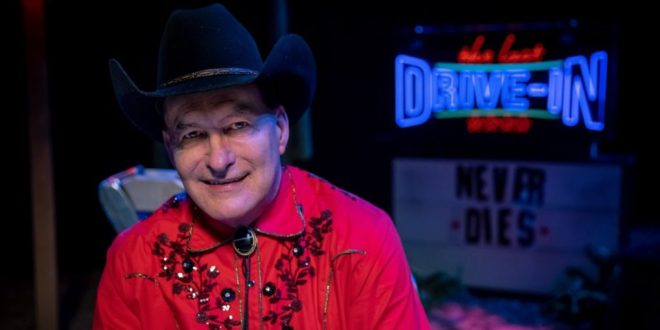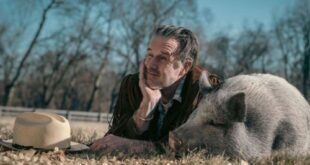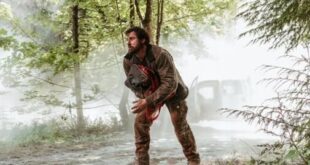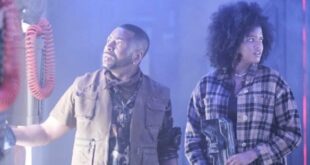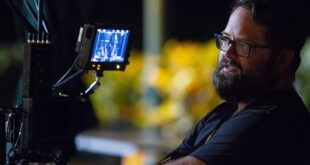Not only is Joe Bob Briggs an incredible horror icon, he has single handedly brought the horror community together with his return as horror host on The Last Drive-In with Joe Bob Briggs, available exclusively on Shudder. I knew I’d be interviewing him for Cinepocalypse 2019, and I’ve done my fair share of phone interviews, but still nothing prepared me for the intense nervousness, and near hyperventilation I felt leading up to it. And to be honest, I finally felt like I had sort of, kinda maybe hit the big time, especially when I answered my phone on Tuesday morning to, “Hi Tiffany. It’s Joe Bob Briggs.” Insert jaw on floor, resisting the urge to throw-up trepidation here. After collecting myself, and the usual pleasantries, our interview began. We talked about his new tour, How Rednecks Saved Hollywood, being a Texan, and of course, horror movies.
Side Note: When I told Joe Bob that I was in Phoenix, he asked that I add in here that the 7pm showing of How Rednecks Saved Hollywood, at the Alamo Drafthouse Tempe has sold out, so they have added a second show at 10:50 pm. Both shows are on Thursday, June 27, 2019.
PH: I know you’re a busy guy, so thank you so much for taking the time to speak with me today. So you’re back on TV as a TV host. What do you feel is the difference in your audiences from 17 years ago, to now?
Joe Bob Briggs: They’re so fucking smart now. Every single thing, every single mistake I make, and they love for me to make mistakes. They love to jump on me. It’s because the internet sort of revolutionized knowledge about exploitation movies. For the hardcore people who really want to dive into horror, or any exploitation genre, there’s just a massive amount of information now. A lot of it’s wrong. If one wrong thing gets on the internet, it becomes a massive feedback loop. Bad information feedback loop. But, nevertheless, people are a lot more sophisticated as far as these movies that I talk about. When I was hosting them 20 years ago, there was not that much knowledge. I would frequently have to call the director, call the producer, all the distribution company, and get any background that i could on the film. There were no blu-rays, there were no DVD extras, there’s no internet for most of 90s. There was an infant internet. So you didn’t really have the massive amount of information that you have now. So, the biggest change has been, that I have to go deeper into the movie than I’ve ever gone in order to feed the people who are hungry for horror. It’s a good thing. It’s a good thing, it’s just that it’s a little bit different than… in the 90s I could just show Evil Dead 2, and everyone was happy. Now we have to get the forgotten gems. I always call them the forgotten gem. From 1988. It had a limited release. Well often, it had no release ever since it was on this show all this time. But because it was made in the 80s, it was a forgotten gem.
I think we should do a lot more foreign horror. It’s not really a popular choice with the other people involved in the decision making because there’s still an aversion to subtitles, there’s an aversion to certain things that are in the… a lot of the foreign horror is considered slow compared to American horror. But still, I would like to show a lot more foreign horror. And not just Italy, and not just Japan. Other countries. Korea, Sweden, even France. Even though I hate France. France. And then we try to show, or at least have a couple so bad that they’re good. Those are always big hits. The biggest audiences that we have are when we show a pure D classic like Hellraiser, or a movie that’s so awful, that the only way to enjoy it is to talk about it. If you don’t talk about it, it’s just awful. If you talk about it, it becomes fun awful. Those are probably the two most popular formats. And then from there we go into the weird foreign stuff, hardcore gore, the gorehounds are always on my ass about it. Show more gore, show more gore, show more gore.
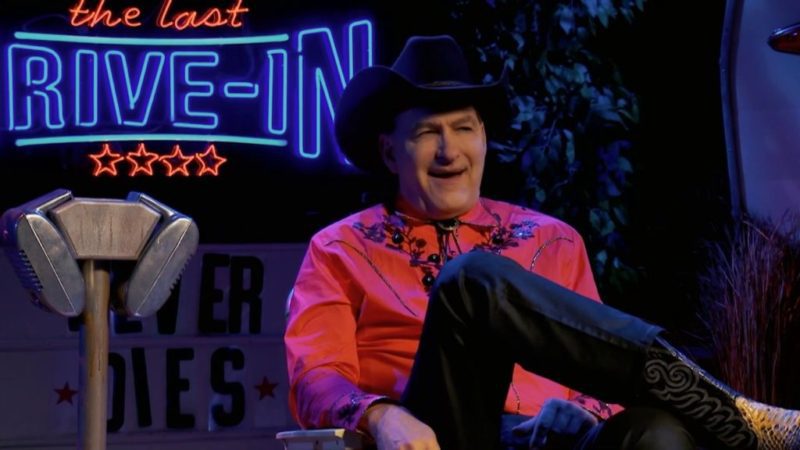
We also have another audience, they want to see The Changeling. They don’t really want to see gore. We try to satisfy both. And The Changeling, that’s another good example, sort of like horror that has a budget and has movie stars in it. Anyway, we try to make sure we cover the whole world of horror. I would like to show more stuff from the last 10 years. The audience seems to always push us towards classic 70s, 80s. And ironically, I would also like to show more black and white stuff from the 40s, early 50s. There’s always an aversion. TV executives are always adverse to showing anything in black and white. But, I personally think our audience would be fine with it. Our audience is different.
PH: When you had your comeback, on Shudder the first time, there was such a rabid response that you crashed Shudder. How did that feel to have that welcoming back?
Joe Bob Briggs: Well, it felt really weird at first. I was depressed because everyone was saying, “What the fuck was wrong with this? I’ll never come back to this network.” And then after about an hour, suddenly I’m getting these messages like, “Oh, my God. Joe Bob. Do you know what happened? Oh, my God.” “What? What happened?” “You crashed the internet.” I was like, “What does that mean?” “Nobody can get on. Nobody can get the show.” “You mean nobody can see the show?” “Right. Nobody can see the show.” “Well, so… is that good or bad?” “It’s great! Nobody can see the show!” “Well, I kind of wanted people to see the show. I worked hard on the show.” “Well, nobody can see it, and it’s great because you crashed Shudder, and you also crashed the Sundance channel.” Well, I don’t give a shit about the Sundance channel, but I didn’t want to crash Shudder. And then during the night, as more and more people got back on, and they were sharing tips online, that’s the night that created our social media community. They would share tips about, “I’ve got it on this device using it this way…” and gradually people got back on. And then people stayed in touch with each other, all through the night and by the time it was over… The one I really cared about, I wanted people to see the last one, which was Pieces. And just when Pieces started, the whole thing crashed again. And so, I guess people were trying to watch the last one. So people didn’t see the first one, and the last one. The two that were the most important. Fortunately, Shudder put everything up for streaming the next day. Mainly so that people wouldn’t be so pissed off. What it did was, it established this tradition that we have now of a community gathering to watch the show in real time. That’s been wonderful. That’s been the most amazing thing I’ve ever experienced in my all my years of working in TV, because you don’t really get that kind of love from your average TV viewers, even if they love your show. This community had formed, and stays with us on any show we do, has been the most amazing thing about it. I go to the conventions, and people come up to the table, and they tell their story. They tell me their story about how they first developed a love for horror because they watched MonsterVision, and they watched it with their brother, or they watched it with their uncle, or they didn’t have anybody to watch it with so they watched it with me. Anyway, they have an emotional connection. That’s wonderful. That’s just wonderful in TV. and that’s wonderful in streaming. And streaming is all about watching stuff on your phone when you’re alone. That’s what streaming tries to do. That’s what they want you to do. It’s great that we have a streaming service where people want to show up for an appointment with the show. That’s amazing. I think it kind of reveals the great flaw in the thinking of Netflix and Amazon. Netflix and Amazon think that all they have to do is put the stuff up, and people will watch it. But when people watch something good, and they watch it on their tablet when they’re alone, then when it’s over, they feel lonely, because then they have to go and tell their significant other the whole plot of the thing, and bore them to tears because there’s nothing worse than somebody telling you the plot of a movie that you’ve never seen. So you feel lonely, then you go warn all your friends, and you think, “What’s wrong with this?” Well, what’s wrong with it is you didn’t watch it with an audience like God intended. That’s the way you’re supposed to watch this stuff. You’re supposed to watch together. That’s the way we’re made. That’s what makes us feel good. And the great thing about our show, is people show up and they watch it together. They show up in a virtual way. They show up on Twitter, or Instagram or increasingly, Slack. They talk to each other on Slack while they’re watching.
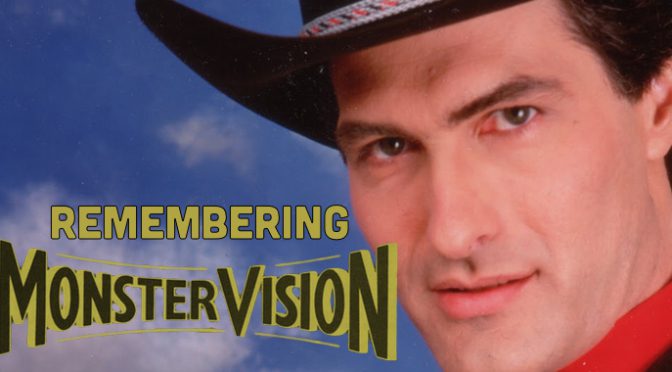
We have all these great groups that have formed, and that’s a huge difference from my experience with anything on TV. And here’s the great thing. It’s blue state people and red state people together. It’s old people and young people together. It’s men and women together. It’s LGBTQ and hetero together. I don’t know how long we can sustain that because we’re Americans, so we like to fight, right? But for the time being, what a wonderful kind of healing thing. Nobody gets angry when it’s horror. It’s been very gratifying to me to be a part of that.
PH: That’s amazing. Horror really does bring people together, I have to agree. It’s like a giant family.
Joe Bob Briggs: And they’re the kindest people in the world too. Sure, they love blood, guts and murder, they tend to be the peace lovers of the world.
PH: With your new show, How Rednecks Saved Hollywood, what made you want to tour again?
Joe Bob Briggs: Well, this is a show that I’ve done at many places over the years. It started about ten years ago. They asked me to do a show at Milsaps College in Jackson, Mississippi. Milsaps College is a very hoity-toity highbrow rich people in a sort of a large school. Rich people in Mississippi go there. Very, very proper place. So I went there, and they wanted me to talk about southern film. So I went there, and I did this show, and I realized at the end of the show, I’d done all the wrong films. I did the Gone With the Wind films, and the Bette Davis film, Jezebel. Stuff like that. The musicals… and I realized, why didn’t I just do hillbilly films, and swamp films? And car chase films and NASCAR films? All that redneck stuff is much more interesting than any of this other stuff because Southerners came from two places. They came from England and Scotland. And people in England, grew cotton and owned slaves. The people from Scotland were just hillbillies, and became our modern rednecks. The Scotland people are so much more interesting. So, I started developing this show, and the Chattanooga Film Festival asked me to come do it as the same show. I said, “Well, the show’s a little bit different now. It won’t be films of the south, it’s going to be the history of the redneck.” And they said, “But it’s in film, right?” And I said, “Yeah, in film.” And they said, “Okay. Do it. Go for it.” And so I did it, and it had a much better reception than the southern film thing with Bette Davis at Milsaps College. And so I started doing the whole thing. I took stuff out, and put stuff in, and I went for the most politically incorrect stuff. I mean, I’m going to do it in Chicago. I’m going to have to give trigger warnings and talk about there is no safe space in this building. You are going to see things your probably don’t want to see but you’re going to see them anyway.
That’s how it developed. Originally, I was just going to do it in the south, because it’s very southern. And then the Coolidge Corner Theatre in Boston asked me to do it, and I said well, if I can do it in Boston and escape, I guess I can do it anywhere. So I did it in Boston, and it worked. I started doing it in cities that don’t necessarily have a redneck heritage. Although we’re like cockroaches. We’re everywhere. There’s no city that’s totally unaffected by a redneck. In terms of the historical migration patterns, I kept it pretty much southern for a long time, and then I started doing it other places. Anyways, it’s a fairly polished presentation by now. It goes very fast. It’s 200 clips and stills, and a little over two hours. So it’s a lot of stuff packed into a… it’s mayhem. Just mayhem. They scared me at the Music Box because I thought it was one of the typical theaters where I usually do this, like Alamo Drafthouse or something. They said oh no. It’s an 800 seat movie palace. I said, “Guys. I have never sold 800 tickets.” And they said, “Oh, we’ll do it for you. We’ll sell them.” And I’m like, “You will not. How are you going to sell…” “Oh, we have this big mailing list, and everything.” Like Oh, my God. But it is Chicago. It’s not Nashville. I don’t know. Anyway, with a little trepidation, I’m going to the Music Box Theater and also, I’m part of a really highbrow film festival. I mean, the film right before me, is a Polish art film with subtitles, so you know. I’m still the odd man out.
PH: If you could sit down, and do commentary on any film, what would it be?
Joe Bob Briggs: Wow. Well, the films I really love, would be harmed by commentary. For example, I love Spinal Tap. You wouldn’t want some asshole talking through Spinal Tap. I love The Hustler, you know, the George C. Scott, Paul Newman original black and white film noir. I love film noir, so Requiem for a Heavyweight the Rod Sterling film. You can’t talk during those films. My favorite commentary that I ever did, where I’m talking through the whole film, is the commentary track on the DVD of a movie called Samurai Cop. Well, Samurai Cop is an awful film. A terrible film. But, it’s a perfect film to do commentary on. So, it’s a mixed bag. If I’m going to do commentary, it has to be a film that has holes in it that gives me room to do commentary. I was actually surprised when Shudder said they wanted to have commercial breaks. They have no commercials. They put in these commercial breaks just to do the commentary. I said, “This is really going to piss people off.” And they said, “No, no. They can go to some other place on the service and watch the film without you if they want to.” I said, “Okay, as long as they know that in advance, because this is kind of dangerous.” And they were like, “Oh, no no no. This is what we want to do.” I interrupt the film like six times. And if you’re interrupting a so bad it’s good film, that’s fine. Who cares? But we’re interrupting Hellraiser. I think the only reason people put up with it, is that they’ve already seen Hellraiser. If they hadn’t seen it, it might be a little annoying to have the commentary right there in your face at dramatic points in the plot of Hellraiser.
PH: What’s your favorite part of being a Texan?
Joe Bob Briggs: My favorite part of being a Texan is the fact that there’s no royalty or hereditary stuff, or any kind of value in being a long time Texan. You can be a Texan in five minutes. So, it still has that frontier quality where you can just show up, and you’re a Texan. That’s what I’ve always liked about it. Why do you go to Texas? It’s ugly. It’s some of the ugliest places in America. So why would you go to Texas? Well, you go to Texas for opportunity because you can immediately start doing shit in Texas. You want to be a cattle rancher? Go to Texas. Try to be a cattle rancher in Switzerland. They have cows there. They won’t let you be a cattle rancher. You go to Texas to be a cattle rancher. I like the openness of it. That’s the great thing about Texas.
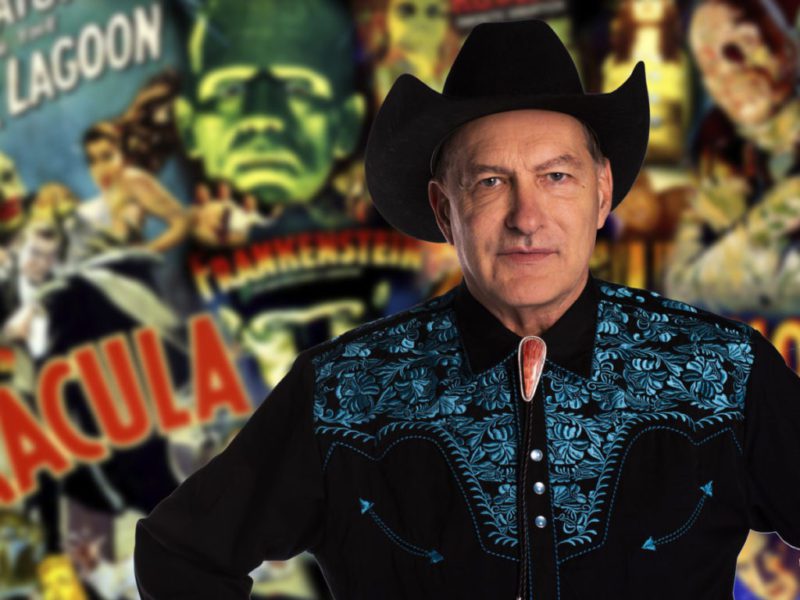
PH: What is your favorite scary movie?
Joe Bob Briggs: Oh, Texas Chainsaw Massacre, the original 1974 Texas Chainsaw Massacre. Definitely. I think that was the first movie that really affected me emotionally when I watched it, and confused me because they have the comedy there at the end, in the final scene there. I was just fascinated with it.
Thank you so much to Joe Bob Briggs for taking the time to speak with us. You can catch How Rednecks Saved Hollywood on Tuesday June 18, 2019 at the Music Box Theater as part of the Cinepocalypse Film Festival.
 PopHorror Let's Get Scared
PopHorror Let's Get Scared
